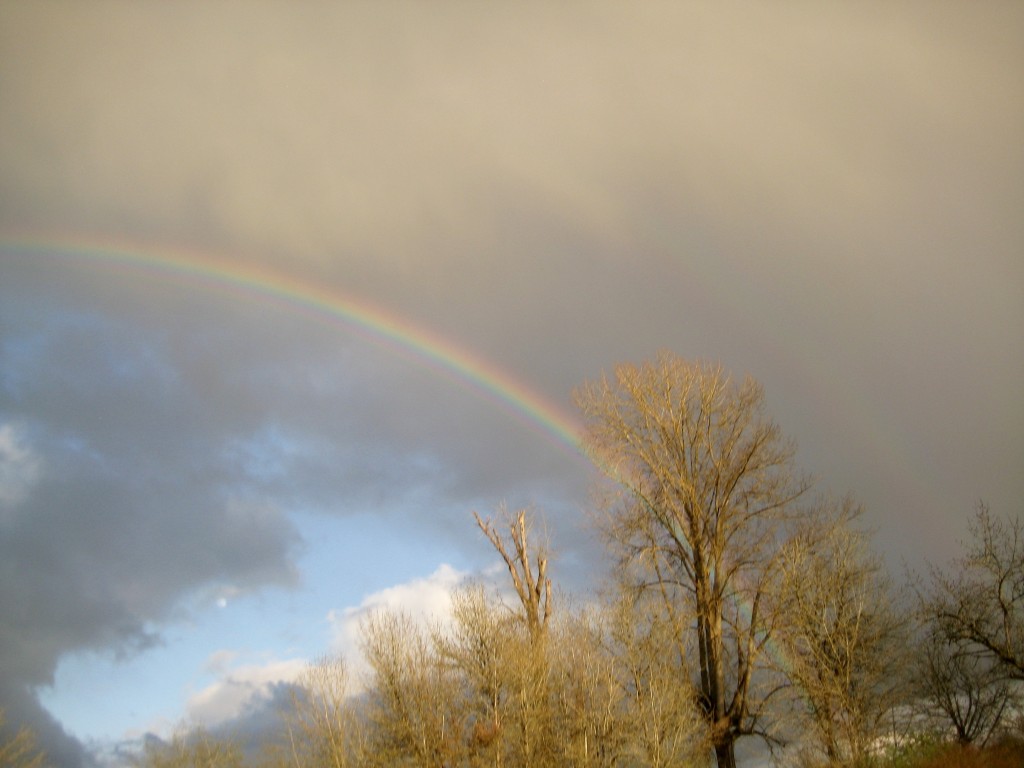Let me open this newsletter with a list of all the things I am grateful for this spring:
I am grateful for five high tunnels in which to plan and grow crops … for two well established orchards that will fruit regardless of how early we can work up the soil … for some money in savings that can give us peace of mind and flexibility in a season that is shaping up to be an exceptional one … for the fortuitous decision to start our season later and have a smaller CSA this year … for all the many blooming trees in that brighten the landscape on these dark days (especially for the feral cherries surprising us now with blossoms in otherwise innocuous hedgerows) … for rainbows.
Folks, have you noticed? It’s been raining since … oh, about late September. I know that much of the country thinks that it always rains in the Pacific Northwet, but really it doesn’t! We often get lots of variety in our weather, including breaks from the rain even during the wet season. This last fall, winter, and now spring, however have shaped up for an exceptionally wet season.
Even though rain is wonderful and necessary and so welcome at times, it has become tedious for many. I know that most people are feeling this in their bones at this point — a deep readiness for a shift in the weather. I’m sure it all feels even more extreme following the last two winters, which were mild and brought very early spring and summer weather. Because last year was early and this year is late, by some estimates, we are about two months later in the season compared to this time last year (in terms of things like temperature, blooming dates, etc.). Two months!
On a farmer email listserve we follow, emails have been more frequent than we expect in spring. There is a sense in these emails that everyone out there is pacing their fields, checking their tractors, tapping their toes with arms crossed, waiting for the opportunity to finally get out there and work up the fields for early late spring planting. In the meantime, the emails are flying with questions about pea trellising and farm dog training (each with some mention toward the end about “when will it stop raining?!?!?!?”).
The long term forecasts don’t offer much immediate hope. The one we follow most closely chimed in this week: “Enough with the rain. Will a dry window (actually, a barn door is needed at this point in time) open in the future? Well, this forecast is not very settling.”
The author goes on to suggest that we’ll have a brief dry window at the end of this week and early next week, followed by another round of wet, cool weather.
So, here I sit, looking out the window at another gray sky over a very green field. A green field that I would love to see turned over and prepping for our spring planting, but alas we wait for that window (or barn door, as it were) to open. We have learned in prior summers that it does not pay to “push it” with our spring tillage. Turning the soil before it is properly dry only leads to compaction and hard clods later in the summer. And we have very well drained soil!
Casey and I assume that the window will open eventually. Surely May will bring weather that tips the balance toward dry. But, we were also discussing the possibility recently that maybe it won’t. At least, not in the way we expect here in Oregon. The evidence is in: climate change does affect weather patterns, and some big ones are shifting. We’ve always assumed that climate change would bring us more and more years like the recent ones, when drought and wildfires were the big concerns. But we’re realizing that the new scenarios might not be that simple.
Of course, it’s so easy to get caught up in the present moment and assume that it will never change, even when change might be a day or two away. This is a very human trait, to take now and expect it to be forever. We can get ourselves into all kinds of trouble this way — not preparing for a more prosperous or a more lean future! Many legends from around the world center on this very topic — people getting into [often interesting!] predicaments by assuming that their current situation is permanent. And, yet change is the one constant. After 11 years of operating this farm, we have learned how little stock we can put in our expectations for each season. And, those years of experience have paid off in that we feel calmer about this spring than I ever could have imagined a decade ago, when we would have been shaking in our boots at this point in such a wet season.
So, we’ll wait and see, along with all the other farmers in the Northwest. And we’ll keep tending our high tunnel crops, stretching them farther into the growing season than we might have anticipated. Presumably at some point we’ll make the shift to harvesting from the fields more and more. And, presumably at some point I’ll stop taking the vitamin-D drops I take in the “dark season”!
Enjoy this week’s vegetables!
Your farmers, Katie & Casey Kulla
~ ~ ~
Upcoming community events of note:
- The “Screenagers” movie documentary is being shown at the McMinnville Covenant Church (2155 2nd St) on Friday, May 5 at 7 pm. The screening is free but donations will be accepted. This is the second time a CSA member has organized a screening of this movie in Mac, and both times I have not been able to attend! But I am so glad that a dialogue is happening about the potential affects of unlimited screen time on developing children. As a parent, I have a lot of concerns and worries about this giant experiment on our youth. Either way, it’s something to examine carefully. You can find out more about the documentary here: http://www.screenagersmovie.com/
- The McMinnville Women’s Choir’s spring concert will be held at the First Baptist Church (125 SE Cowls St, McMinnville) on Sunday, May 7 at 4 pm. Tickets are available for purchase at Oregon Stationers ($8 adults; children are free).
- We also need to schedule our upcoming farm events! Usually we have a potato planting and potluck in May but we have been feeling very reluctant to plan any kind of farm events while we are still in the midst of this protracted winter-y weather. Even though the calendar tells us it’s time to start planning our events, it’s hard for us to believe that. Hopefully soon we’ll get dates scheduled so we can share them with you!
~ ~ ~
Second CSA payment due! I sent out statements last week with payment reminders. Your second CSA payment is due to us by next Thursday, April 27. You can mail a check to Oakhill Organics, P.O. Box 1698, McMinnville OR 97128; or bring cash or check with you to pick-up this week or next! Please let me know if you have any questions about your account or balance due!
~ ~ ~
Meet this week’s vegetables:
- Apples — This week’s apples are mostly Cortland variety.
- Purple sprouting broccoli — The supply is limited this week, and we’ll label it accordingly.
- Radishes
- Marina di chioggia winter squash — An OSU professor who does trials of vegetable varieties recently sent out an email about a winter squash study. They wanted to find varieties that were especially suited to long-storage. Marina di chioggia wasn’t on their list, so Casey emailed to share it with her. Apparently many farmers are daunted by the size (yes, they are huge!), but we reassured her that we think it’s worth it to have delicious winter squash as late as April. (And that’s another thing we’re grateful for this odd spring!)
- Seasonal salad mix
- Cabbage
- Kale
- Beets
- Sunchokes
- Potatoes
- Green onions
- Green garlic



